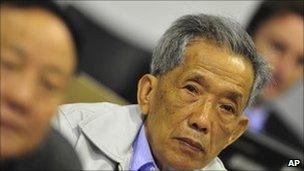Khmer Rouge jailer Duch appeals against conviction
- Published

Comrade Duch argues the Khmer Rouge tribunal should not be judging him
A UN-backed tribunal in Cambodia is hearing the appeal of a former Khmer Rouge member who was convicted of crimes against humanity.
Kaing Guek Eav was in charge of a detention centre in the late 1970s and oversaw the deaths of around 15,000 people.
But now the man best known as Comrade Duch is arguing he should not have been tried at all.
The Khmer Rouge tribunal has a strictly defined role.
That is to bring to justice the surviving senior leaders of the Khmer Rouge and the people most responsible for the worst crimes committed during the four years Pol Pot's government controlled Cambodia.
Comrade Duch claims he falls into neither category.
Baffling
He has admitted that he ran the notorious S-21 detention centre in Phnom Penh.
During the public phase of his trial he even apologised to relatives of the people who died there.
But he insisted that he was only following orders and that he and his family might have been killed if he had not done as he was told.
The trial chamber rejected his arguments and passed a sentence of 35 years for crimes against humanity, torture and pre-meditated murder.
Youk Chhang is the director of the Documentation Centre which investigated the events at S-21.
He says Cambodians would be baffled by Duch's appeal.
"It's difficult for the public in general to understand the court procedure - they're not lawyers," he said.
"And it's because Duch himself has said all these things during the hearing already: 'Well, I admit it; now I don't'. And then people find that crazy."
The appeal hearing should be followed within months by the long-awaited second trial at the tribunal.
Four senior surviving Khmer Rouge leaders are facing charges of genocide for creating the policies which led to the deaths of around 2m people.